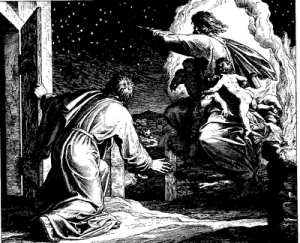Now the Lord said to Abram, ‘Go from your country and your kindred and your father’s house to the land that I will show you. I will make of you a great nation, and I will bless you, and make your name great, so that you will be a blessing. I will bless those who bless you, and the one who curses you I will curse; and in you all the families of the earth shall be blessed.’
So Abram went, as the Lord had told him; and Lot went with him. Abram was seventy-five years old when he departed from Haran. Abram took his wife Sarai and his brother’s son Lot, and all the possessions that they had gathered, and the persons whom they had acquired in Haran; and they set forth to go to the land of Canaan. When they had come to the land of Canaan, Abram passed through the land to the place at Shechem, to the oak of Moreh. At that time the Canaanites were in the land. Then the Lord appeared to Abram, and said, ‘To your offspring I will give this land.’ So he built there an altar to the Lord, who had appeared to him. From there he moved on to the hill country on the east of Bethel, and pitched his tent, with Bethel on the west and Ai on the east; and there he built an altar to the Lord and invoked the name of the Lord. And Abram journeyed on by stages towards the Negeb.
This passage describes for us the original call of the one who will come to be known as the Father of Faith, Abraham. But before he was Abraham, he was simply Abram. A descendent of Noah, Abram is told by God to go to the land of Canaan. It is this land, Canaan, which God promises to Abram and his descendants in perpetuity.
But first, if we back up a bit, you will remember that Noah cursed Canaan to be the lowest of slaves to his brothers. Noah said, “blessed by the Lord my God be Shem and let Canaan be his slave.” (Gen 9:25-26)
And yes, you guessed it; Abram is a descendent of Shem. And in this passage God repeats the blessing to Abram and to all those that bless Abram. But there is a warning; to all those that curse Abram, God will curse them too.
 From this passage and others like it, modern Israel makes an historical claim to the Promised Land, the West Bank and the Gaza Strip. The justification for an Apartheid style occupation of the land is justified through scripture, as ordained by God. Those within the land that are not the chosen people are second-class citizens, or to use biblical terms, slaves and the descendants of Canaan.
From this passage and others like it, modern Israel makes an historical claim to the Promised Land, the West Bank and the Gaza Strip. The justification for an Apartheid style occupation of the land is justified through scripture, as ordained by God. Those within the land that are not the chosen people are second-class citizens, or to use biblical terms, slaves and the descendants of Canaan.
I am always suspicious of a God that curses, imprisons and allows the control of others, the domination of other people and to own other human beings, especially in light that Christ died upon the cross for the forgiveness of all of humanity.
And as you can see I am falling prey myself to reading back into scripture through a Christian lens. So trying to step back, what are we to make of Abrams call? Why are the descendants of Canaan, the Canaanites cursed? What have these descendants of Noah done to anger God in such a way?
The reason I find this passage and others like it troubling is that it is ‘othering’. It creates a dichotomy between the chosen people and those God does not choose, even if they are righteous and blameless before the Lord. It separates instead of bringing together. And following on the heels of the Flood narrative where God eliminated all of humanity save Noah and his descendants, what does this say?
Is humanity that fallen that in a few generations the work that God accomplished can so easily be turned over? I would think not.
This passage is a blending of both P and J. So we could see how P would want to justify their conquering of the land. For J though, it would have been written for a wandering nomadic people coming to settle in a foreign land; almost a precursor to the Exodus. And there again I am getting ahead of myself.
Perhaps it is something as simple as that. God will bless those that are kind to the stranger; the stranger who has just arrived in what will come to be known as the Promised Land. Blessings for those that are kind to the stranger, whether you are a resident of the land or one who is immigrating.
